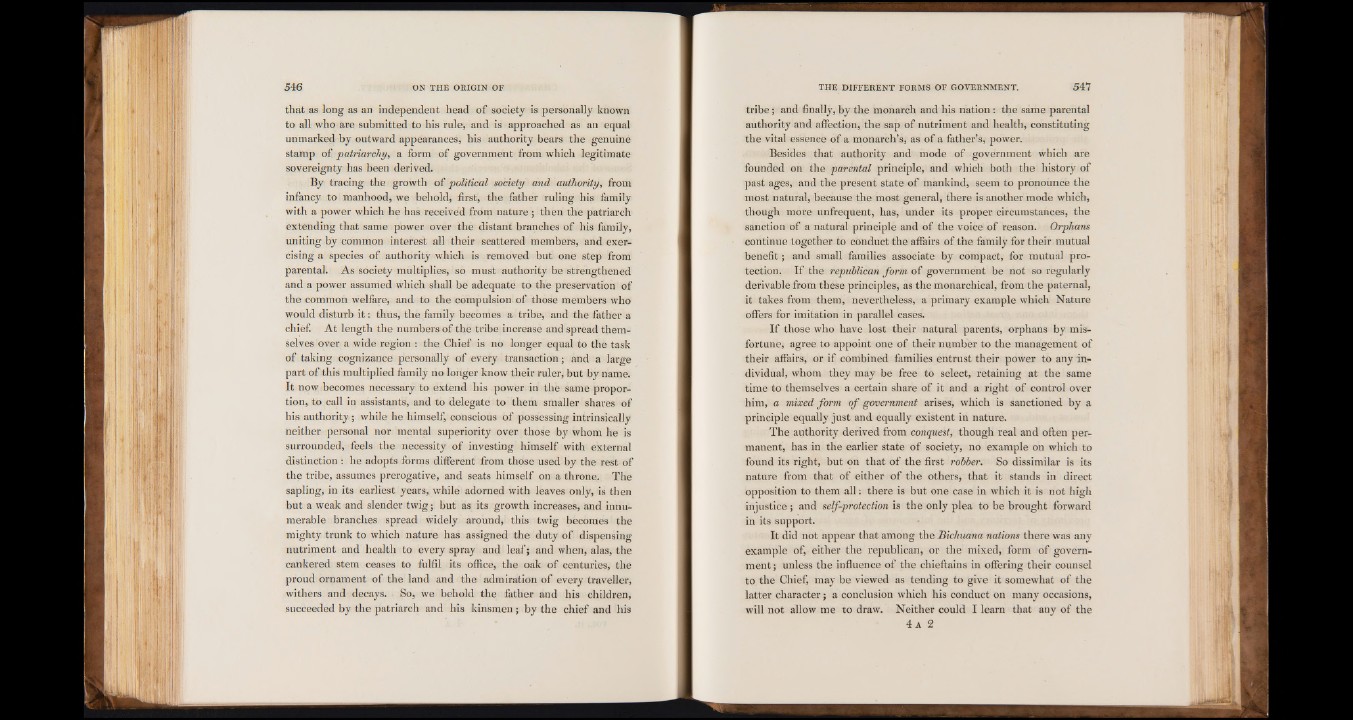
that as long as an independent head of society is personally known
to all who are submitted to his rule, and is approached as an equal
unmarked by outward appearances, his authority bears the genuine
stamp of patriarchy, a form of government from which legitimate
sovereignty has been derived.
By tracing the growth of political society and authority, from
infancy to manhood, we behold, first, the father ruling his family
with a power which he has received from nature ; then the patriarch
extending that same power over the distant branches of his family,
uniting by common interest all their scattered members, and exercising
a species of authority which is removed but one step from
parental. As society multiplies, so must authority be strengthened
and a power assumed which shall be adequate to the preservation of
the common welfare, and to the compulsion of those members who
would disturb it: thus, the family becomes a tribe, and the father a
chief. At length the numbers of the tribe increase and spread themselves
over a wide region : the Chief is no longer equal to the task
of taking cognizance personally of every transaction; and a large
part of this multiplied family no longer know their ruler, but by name.
It now becomes necessary to extend his power in the same proportion,
to call in assistants, and to delegate to them smaller shares of
his authority; while he himself, conscious of possessing intrinsically
neither personal nor mental superiority over those by whom he is
surrounded, feels the necessity of investing himself with external
distinction : he adopts forms different from those used by the rest of
the tribe, assumes prerogative, and seats himself on a throne. The
sapling, in its earliest years, while adorned with leaves only, is then
but a weak and slender twig; but as its growth increases, and innumerable
branches spread widely around, this twig becomes the
mighty trunk to which nature has assigned the duty of dispensing
nutriment and health to every spray and leaf; and when, alas, the
cankered stem ceases to fulfil its office, the oak of centuries, the
proud ornament of the land and the admiration of every traveller,
withers and decays. So, we behold the father and his children,
succeeded by the patriarch and his kinsmen; by the chief and his
tribe; and finally, by the monarch and his nation : the same parental
authority and affection, the sap of nutriment and health, constituting
the vital essence of a monarch’s, as of a father’s, power.
Besides that authority and mode of government which are
founded on the parental principle, and which both the history of
past ages, and the present state of mankind, seem to pronounce the
most natural, because the most general, there is another mode which,
though more unfrequent, has, under its proper circumstances, the
sanction of a natural principle and of the voice of reason. Orphans
continue together to conduct the affairs of the family for their mutual
benefit; and small families associate by compact, for mutual protection.
If the republican form of government be not so regularly
derivable from these principles, as the monarchical, from the paternal,
it takes from them, nevertheless, a primary example which Nature
offers for imitation in parallel cases.
If those who have lost their natural parents, orphans by misfortune,
agree to appoint one of their number to the management of
their affairs, or if combined families entrust their power to any individual,
whom they may be free to select, retaining at the same
time to themselves a certain share of it and a right of control over
him, a mixed form of government arises, which is sanctioned by a
principle equally just and equally existent in nature.
The authority derived from conquest, though real and often permanent,
has in the earlier state of society, no example on which to
found its right, but on that of the first robber. So dissimilar is its
nature from that of either of the others, that it stands in direct
opposition to them all: there is but one case in which it is not high
injustice ; and self-protection is the only plea to be brought forward
in its support.
It did not appear that among tlie Bichuana nations there was any
example of, either the republican, or the mixed, form of government
; unless the influence of the chieftains in offering their counsel
to the Chief, may be viewed as tending to give it somewhat of the
latter character; a conclusion which his conduct on many occasions,
will not allow me to draw. Neither could I learn that any of the
4 a 2